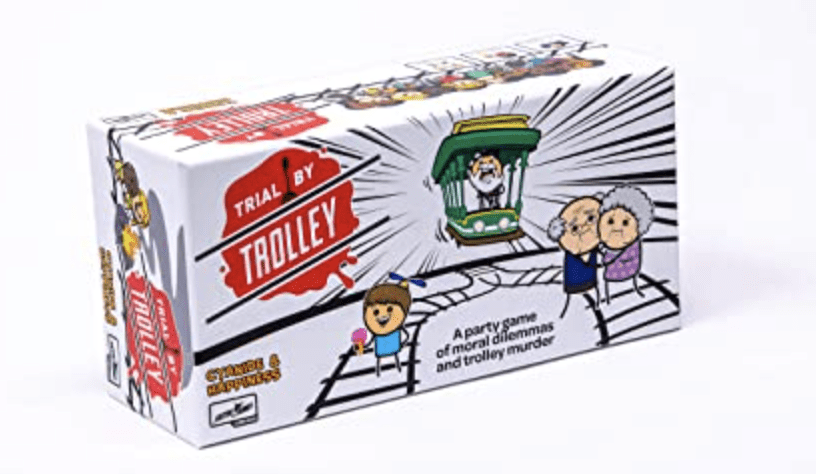Name of Game: Trial by Trolley
Creator: Cyanide and Happiness (could not find names of individual creators)
Platform: Originally a card game, but we played online version of same game
Trial by Trolley is a “choosing game” similar in mechanics to Cards Against Humanity, Red Flags, What Do You Meme, and the game we’re making! The basic premise of all these types of games is that players come up with a combination of cards that is most appealing to a single designated “chooser” for that round and try to get the chooser to select theirs in order to win points. To save costs, we played a free online version with the same graphics as the card game.
In terms of mechanics, what makes Trial by Trolley different from other popular choosing games is that decisions are made by teams that change every round, rather than individuals. This is done largely because the process of adding and modifying cards is extensive, so it would take too much time for the chooser to read through every single card combo. The chooser rotates, and everyone who’s not the chooser splits down the middle of the table and forms a temporary team (which are called “tracks” in keeping with the Trolley theme). There are three types of cards: Innocent, Guilty, and Modifier. Innocent Cards contain descriptions of “good” people one wouldn’t want to kill, Guilty Cards contain descriptions of “bad” people one would want to kill, and Modifier Cards are different properties players can tack on to either Innocent or Guilty cards.
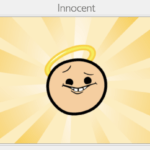
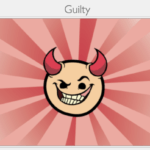
Together, each team gets to put one random Innocent card and an Innocent card from their hand onto their side of the tracks, and can place a Guilty card onto the other team’s tracks to convince the conductor that their side is more worth saving. Both sides are encouraged to “argue their case” according to the rulebook. Whichever team has the worst side, according to the conductor, gets a “Death Token”, and the player with the least tokens at the end loses (another minor difference from other games of this type!).
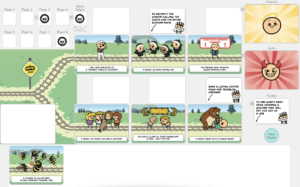
I did two playtests of this game – one with a group of relative strangers who got together for the point of playtesting, and another with a group of close friends over casual drinks. I noticed that among the strangers, the atmosphere was more reserved but still had some laughs at good card combinations. Players focused more on making sarcastic utilitarian arguments; for example, that “a group of diplomats about to bring world peace” would bring more use to the world than “your own grandmother”. However, when playing with close friends, even more time was spent on the discussion, especially when deciding what cards to put down. For example, we considered that the chooser was in a relationship when deciding to put down the card “a clone of your SO … but hotter”. The prompts were more tailored towards individual choosers, and the rotating teams helped us get to know all players in the room better.
The graphics is themed around the Trolley Problem, which is a well-known moral dilemma about whose lives are more important than others. It’s 18+ (since it’s unashamedly themed around murder) and takes a comical approach in the card design. Cartoon stick figures with key characteristics represent the characters of the “Innocent” and “Guilty” cards, and the cards themselves don’t depict anything graphic or gory; the cartoon facial expressions keep it lighthearted. This game relies heavily on creating fun through fellowship, as players bond over what decisions to make; the simple, yet entertaining graphics allows room for light and entertaining discussion. Another form of fun in this game is fantasy; players can make heavy moral decisions with absolutely no real-life consequences that they would never get to do in real life. The non-gory graphics in this game make the players able to stay in the “magic circle” and participate in the game without the actual act of murder weighing too heavily on their minds (because this game really isn’t about killing people!).
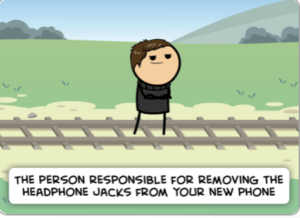
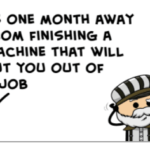
If no restrictions on the number of innocent or guilty cards were made, players could easily abuse the rules by placing all guilty cards on the other team’s side if they had a good hand, so that they had no way of winning. Or, if the teams stayed constant, the chooser would clearly be biased towards their own team so they would pick based on who they wanted to win, not who had the funniest track. The game prevents such abuses of mechanics via thorough rules; however, in a game of moral dilemmas, it is important to think about emotional abuses in a social game as well. There are no safeguards against users putting down card combinations that could be offensive to people (such as “A group of nuns” being an Innocent card in light of what the Catholic church has a history of, or “Some guy mugging your friend”, which could be traumatic for some players to see visually even in cartoon form). If I were to change the online game, I would add some sort of feature where players can choose not to play with cards of a certain theme, or there were auto-warnings of potentially harmful card combinations. In a physical game, these could be sorted out by hand.
Overall, Trial by Trolley was really entertaining, and it’s a great game to play with friends or even strangers 🙂


